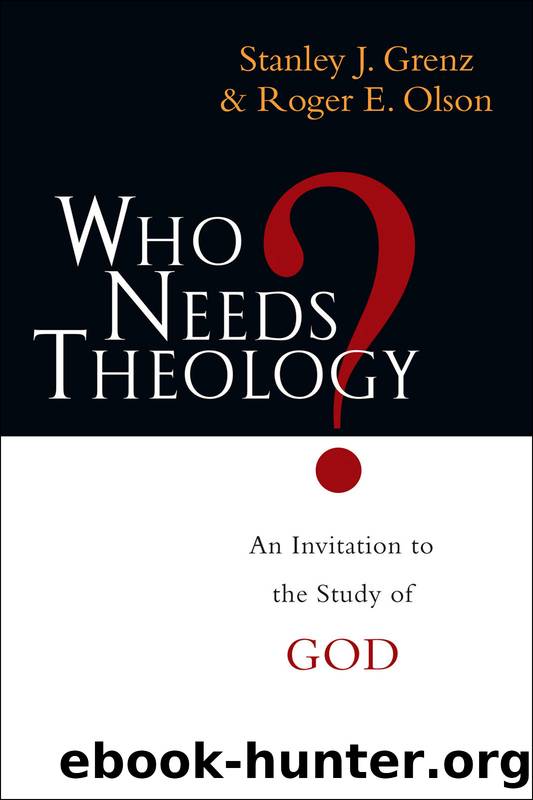Who Needs Theology?: An Invitation to the Study of God by Olson Roger E. & Grenz Stanley J

Author:Olson, Roger E. & Grenz, Stanley J.
Language: eng
Format: epub
Publisher: InterVarsity Press
Published: 2009-09-19T16:00:00+00:00
2. Categorizing Valid Christian Beliefs as Dogma, Doctrine or Opinion
B. Theology’s Constructive Task
1. Constructing Unified Models of Diverse Biblical Teachings
2. Relating Those Models Relevantly to Contemporary Culture
Theology’s Traditions
A part of understanding what theology is must be understanding the various traditions within which it is practiced. Unfortunately, perhaps, since at least the time of the schism between the Eastern Orthodox family of churches and the Roman Catholic Church, theological reflection has been carried out in somewhat different ways depending on these communities’ forms of life. Here we will provide brief sketches of four major historical theological traditions of Christianity and close with some cursory remarks about contemporary theology.
Some scholars of church history speak of the period before A.D. 1054 as “the time of the undivided church.” While the first millennium of church history certainly saw various small schisms, visible, structural unity existed among all the bishops of the great Christian cities of the Roman Empire. (For the sake of brevity we must leave aside discussion of Christian communities in Asia and Africa of which very little is known from that time period.) Except for occasional disputes between them, which sometimes led to brief periods of excommunication of one bishop by another, the churches under Rome and Constantinople existed in fellowship.
Growing discontent and debate over the power and authority of the bishop of Rome and over exact definitions of the Trinity eventually led to a formal and final split between these two great Christian cities and their families of churches in A.D. 1054. No longer was there a “Great Church” undivided. Since then Western scholars have referred to these as the Eastern Orthodox and Roman Catholic traditions and churches. While they share much in common, they have marked differences that lead to different styles of theology.
The Eastern Orthodox churches believe that the first seven ecumenical councils of the undivided church (Nicea I in A.D. 325 through Nicea II in A.D. 787) constitute a definitive body of interpretations of Christian doctrine. They reject any further development of doctrine as well as any notion of papal infallibility. For Eastern Orthodoxy theological reflection now consists primarily of the critical activities described above. All constructive activity took place in the first seven centuries. Eastern theologians have traditionally attached little importance to the task of making Christian doctrine relevant to contemporary culture.
One notable feature of Eastern Orthodox theology is its focus on Christian mystical experience—especially experience of God through liturgy (worship), prayer with icons (holy images), and contemplation of God’s attributes. Theology is not seen so much as a way of gaining knowledge for practical or apologetic use as a path to wisdom. Within this tradition one finds very little interest in or emphasis on rational theological reflection. Spirituality absorbs theology.
The Roman Catholic Church, in contrast, holds to an ongoing process of discovery of theological truth. There is no limit to the number of possible ecumenical councils where dogmas and doctrines may be definitively pronounced. So far the church of Rome recognizes twenty-one councils as truly ecumenical and therefore authoritative.
Download
This site does not store any files on its server. We only index and link to content provided by other sites. Please contact the content providers to delete copyright contents if any and email us, we'll remove relevant links or contents immediately.
The Lost Art of Listening by Michael P. Nichols(7494)
Why I Am Not A Calvinist by Dr. Peter S. Ruckman(4149)
The Rosicrucians by Christopher McIntosh(3513)
Wicca: a guide for the solitary practitioner by Scott Cunningham(3167)
Signature in the Cell: DNA and the Evidence for Intelligent Design by Stephen C. Meyer(3132)
Real Sex by Lauren F. Winner(3016)
The Holy Spirit by Billy Graham(2944)
To Light a Sacred Flame by Silver RavenWolf(2814)
The End of Faith by Sam Harris(2733)
The Gnostic Gospels by Pagels Elaine(2528)
Waking Up by Sam Harris(2454)
Nine Parts of Desire by Geraldine Brooks(2361)
Jesus by Paul Johnson(2352)
Devil, The by Almond Philip C(2326)
The God delusion by Richard Dawkins(2305)
Heavens on Earth by Michael Shermer(2278)
Kundalini by Gopi Krishna(2180)
Chosen by God by R. C. Sproul(2161)
The Nature of Consciousness by Rupert Spira(2104)
